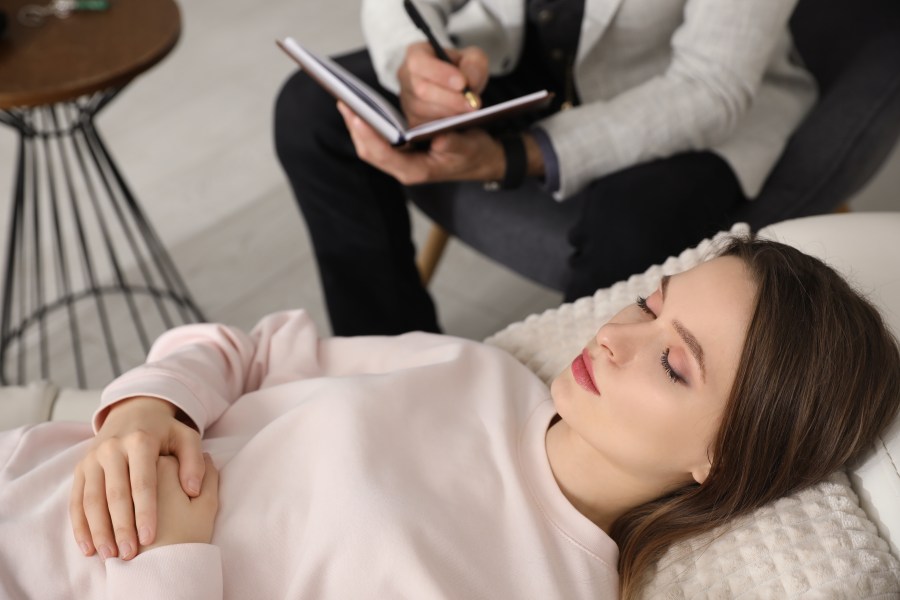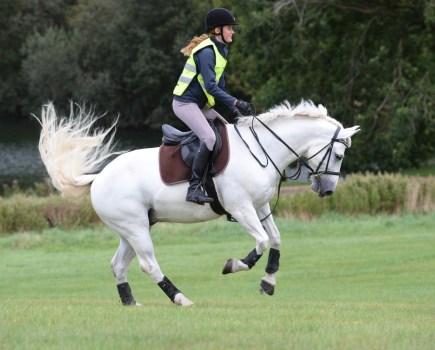What comes to mind when you picture hypnotherapy? Perhaps a pocket watch swaying back and forth, being told “you’re feeling very sleepy”, or even a TV or stage show where the hypnotist has people believing that they are chickens? Well, this isn’t quite what happens during hypnotherapy sessions, and certainly not for riders addressing confidence concerns.
“Essentially, hypnosis is a state of what we’d call trance, which can be described as deep relaxation,” says master hypnotherapist Julia McHugh. The thought of having hypnotherapy may initially spark a little anxiety, a fear that you have no control over yourself, but Julia stresses that this isn’t the case.
“Hypnotherapy can’t be done to you, it’s done with you. That’s one of the biggest misconceptions,” Julia explains. “You’re still aware of your surroundings and in total control — your hypnotherapist is just like a guide.”
Without even realising it, you have probably been in a trance before.
“An example is if you’re in your car, driving a familiar route, such as to the supermarket, to your work office, or to the yard. You remember driving, but you might not remember specific parts of the journey, such as stopping at a set of traffic lights. That is a light state of trance.”
What goes on inside the brain?
Hypnotherapy can help you to overcome trauma, fears and phobias, which is why it can be an effective means of improving confidence. But how exactly does this happen?
“We have two parts of our minds: the conscious and the unconscious,” says Julia. “It’s a bit like an iceberg — the conscious mind is visible as it’s on top of the water, while the unconscious mind is below. It’s mysterious and we don’t really think about it because it controls things that we don’t have to think about, such as breathing and blinking.”
Your unconscious mind is also the key to keeping you safe — if you’re in a situation with an element of danger, it is your unconscious mind that will bring it to your attention. This could be when handling or riding your horse at home or a competition, when hacking or jumping; any time, in fact, when there is a risk. For many riders with confidence issues, their unconscious mind starts to run away with them, and the conscious mind backs it up.
This can be particularly true if you have had a bad experience, such as falling off, as your brain wants to protect you from it repeating, even if it was an accident or is unlikely to happen again.
“Fear can kick in when it’s not required, like a false alert,” says Julia. “Your unconscious mind triggers the fear, and your conscious mind looks for more evidence to support it and disregards things that are logical.”
How hypnotherapy helps
No matter how you have lost your confidence, hypnotherapy gives you the chance to change what your brain is thinking. This is because the way your brain processes information is different when you’re awake compared to when you’re in a trance.
“Your mind doesn’t know the difference between reality and imagination, which gives us a chance to re-wire the neural pathways causing your fear or lack of confidence,” says Julia. “During hypnosis your unconscious mind is open to change, so you can address problems like unwarranted fear, clear blockages and tackle limited belief or self doubt.”
It may sound impossible, but more evidence is shedding light on what goes on in the brain during hypnotherapy sessions.
“Researchers from the University of Turku in Finland found that during hypnosis the brain shifted to a state where individual brain regions acted more independently of each other. This is what allows the changes to take place during hypnotherapy, and for them to be easier to implement than when trying to do so consciously,” says Julia. “This was confirmed by research at Harvard University, which found that the two areas of the brain responsible for processing and controlling what is going on in your body showed greater activity during hypnosis, and they also appear to be disconnected when in a trance. This is what allows your brain to address the problems you want to resolve.
“So there is scientific evidence out there to show that hypnotherapy works.”
When in a trance, you can practise new behaviours, feelings and emotions, or visualise your desired outcome, such as jumping a clear round, or hacking out safely. As with all things, hypnotherapy may not be your cup of tea.
“It works best if you’re quite visual and can create images in your head,” says Julia. “If you’re not visual, then I’d focus more on feelings. This can be more challenging, but it does work.”
Would you like to give hypnotherapy a go? Julia is offering £50 off her Mindset Magic package using the voucher code “Mindset Magic 50”. Click here to find out more about the package, and fill in this form to book.
About the expert: Julia McHugh is a master hypnotherapist, advanced solution-focused and analytical hypnotherapist and advanced applied psychology equestrian coach. She works with riders to help them overcome many issues, from fear to bereavement. To find out more, visit yourhorseisyourmirror.com
Check out our subscription offer








